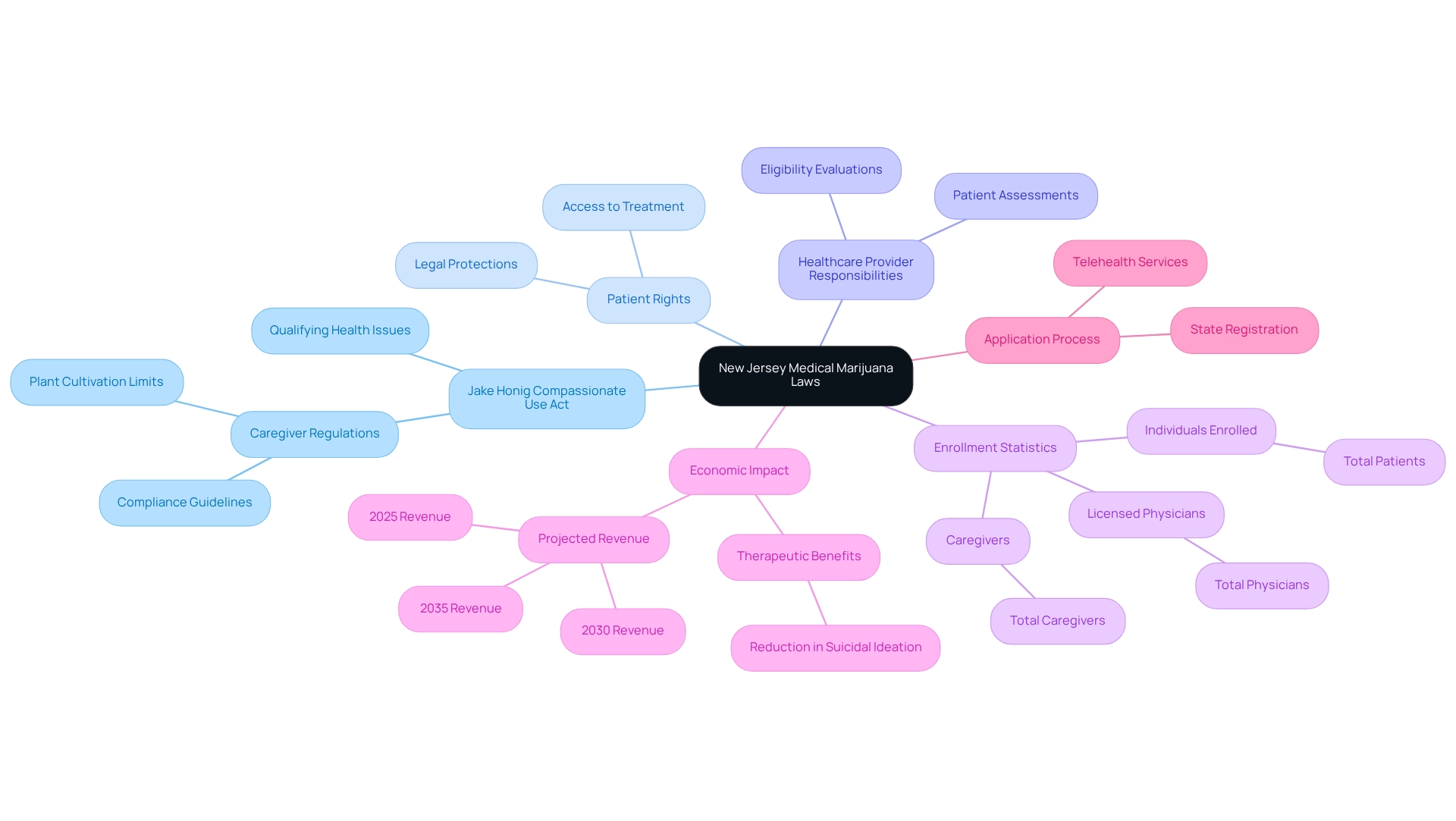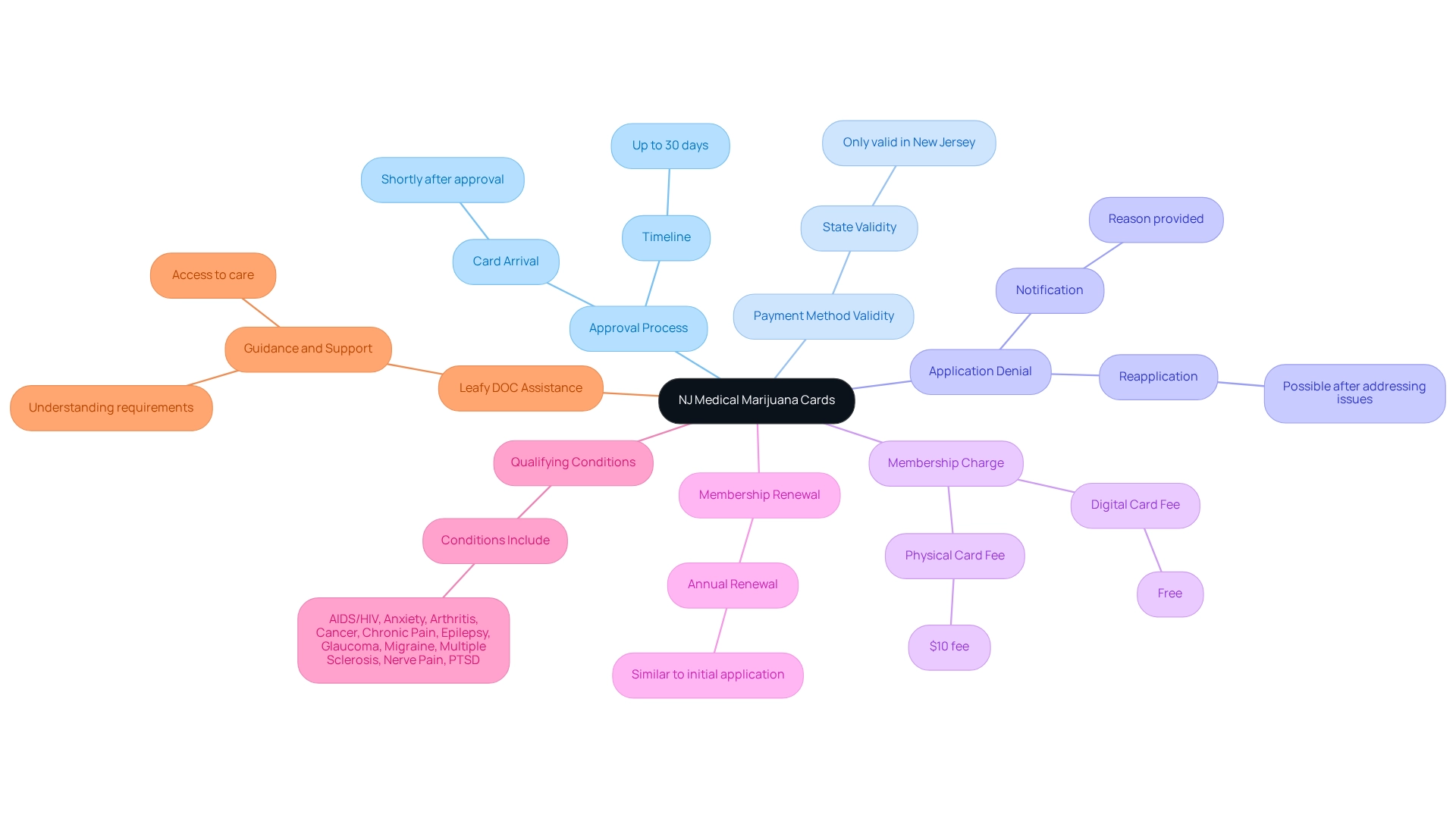How to Get Your NJ Medical Marijuanas Card: A Step-by-Step Guide
by Maya Green · April 10, 2025
Discover the essential steps to obtain your NJ medical marijuanas card efficiently.

Overview
If you’re considering obtaining a New Jersey medical marijuana card, it’s important to know that the journey begins with a consultation with a licensed cannabis physician. This step is crucial as it helps assess your eligibility based on qualifying health conditions. You may find that understanding this process can alleviate some of the concerns you might have.
The process involves several important steps:
- Securing a physician’s certification is essential. This certification not only validates your need for therapeutic cannabis but also sets the foundation for your application.
- As you complete the application, remember to gather all necessary documentation. This preparation can make the process smoother and less daunting.
- Additionally, it’s vital to familiarize yourself with the legal rights and responsibilities outlined in the Jake Honig Compassionate Use Medical Cannabis Act. This act is designed to support access to therapeutic cannabis for those in need, ensuring that you are informed and empowered.
As you navigate this process, take a moment to reflect on your journey and the support available to you. Remember, you are not alone in this. With each step you take, you are moving closer to accessing the relief you deserve. Don’t hesitate to reach out for support and guidance as you embark on this important path.
Introduction
Navigating the complexities of medical marijuana laws can feel overwhelming, particularly in a state like New Jersey, where regulations are constantly changing. At the heart of this landscape is the Jake Honig Compassionate Use Medical Cannabis Act, which aims to ensure patients have safe access to cannabis for therapeutic purposes.
With over 63,000 patients currently enrolled, it’s crucial to understand the rights and responsibilities outlined in this legislation for anyone considering medical cannabis as a treatment option. This article will explore the essential aspects of New Jersey’s medical marijuana laws, the application process for obtaining a medical marijuana card, and the vital role that healthcare providers play in guiding patients on their journey toward relief.
Remember, you are not alone in this process; support is available to help you make informed decisions.
Understanding New Jersey’s Medical Marijuana Laws
New Jersey’s cannabis regulations are primarily governed by the Jake Honig Compassionate Use Medical Cannabis Act. This important legislation allows individuals with qualifying health issues to obtain cannabis for therapeutic purposes. It not only outlines the process for acquiring a New Jersey medical marijuana card but also defines the rights of individuals and the responsibilities of healthcare providers involved in the program. As of March 2025, there are 63,132 individuals enrolled in the Medicinal Cannabis Program, supported by 4,271 caregivers and 1,572 licensed physicians. This reflects a robust network dedicated to facilitating access to cannabis for those in need.
The Act emphasizes the rights of those seeking treatment, ensuring individuals are protected under state law. It also outlines the responsibilities of healthcare providers, mandating thorough evaluations to determine eligibility for medical cannabis use. Understanding these laws is essential for individuals to fully comprehend their rights and the legal protections available to them.
Key provisions of the Jake Honig Compassionate Use Medical Cannabis Act allow certain small cannabis growers, referred to as ‘caregivers,’ to cultivate a limited number of plants per individual, following state and local regulations. This aspect of the law aims to enhance access to cannabis, especially for individuals who may face challenges in obtaining it through traditional dispensaries. It’s important to remember that these caregivers must adhere to specific regulatory guidelines to ensure compliance with the law.
In light of recent developments, the cannabis industry is projected to generate total revenue of $45.3 billion in 2025, with expectations of growth to $67.2 billion by 2030 and $87.0 billion by 2035. This economic growth highlights the rising acceptance and integration of cannabis into healthcare practices. Furthermore, a 2024 study by New Frontier Data discovered that three months after starting cannabis therapy, there was a decrease in both the percentage of the sample reporting suicidal thoughts and the average intensity of those thoughts. This emphasizes the therapeutic advantages of cannabis.
For individuals looking to acquire their cannabis authorization, Leafy DOC provides streamlined telehealth services that enable secure and efficient assessments from the comfort of home. Patients can submit an intake form and schedule an on-demand telehealth appointment with licensed physicians who will assess their qualifying conditions, including chronic pain, anxiety, and epilepsy. This client-focused approach not only streamlines the certification process but also enables individuals to access the therapeutic benefits of medical cannabis.
After receiving their certification, individuals may need to register with the state to obtain their New Jersey medical marijuana card, depending on their location. This process can vary, so understanding the specific requirements in their state is essential. For more detailed information on the Jake Honig Compassionate Use Medical Cannabis Act and its implications, it is advisable to consult the New Jersey Cannabis Regulatory Commission’s official website.
Furthermore, it’s worth noting that a total of 28 microbusiness licenses were awarded annually, reflecting the evolving landscape of the cannabis industry in New Jersey. Patients can also consult FAQs about qualifying conditions, such as AIDS, anxiety, and chronic pain, to better understand their eligibility for cannabis.
Who Qualifies for a Medical Marijuana Card in NJ?
To obtain a New Jersey medical marijuana card, individuals must be diagnosed with one or more qualifying health conditions recognized by the state. These conditions include chronic pain, anxiety, PTSD, cancer, and several others. As of 2025, the New Jersey Medicinal Cannabis Program continues to expand its list of qualifying conditions, reflecting the evolving understanding of cannabis benefits.
It’s important to recognize that about 30% of individuals diagnosed with chronic pain in New Jersey have pursued cannabis as a treatment alternative. This highlights its significance in pain management and symptom alleviation for conditions such as cancer.
According to Senate Bill 119, individuals are permitted to possess a maximum of three ounces of cannabis for a 30-day duration. This is vital information for those contemplating this treatment option. Applicants must be residents of New Jersey and at least 18 years old; however, minors can apply with the consent of a legal guardian. It is crucial for applicants to consult with a licensed healthcare provider registered with the New Jersey Medicinal Cannabis Program to confirm their eligibility for a medical marijuana card.
This step not only ensures adherence to state regulations but also provides individuals with expert guidance on their specific healthcare needs and the potential advantages of cannabis. Healthcare professionals emphasize the importance of understanding the individual circumstances surrounding each patient’s condition. As cognitive neuroscientist Earl Miller notes, “Once we understand on the brain level what effect it is having on cognition, then we can see how it can be applied for all sorts of purposes, but first we need to know exactly what it’s doing.” This underscores the need for ongoing research and understanding of therapeutic cannabis.
As the landscape of cannabis continues to evolve, staying informed about eligibility criteria and qualifying conditions is essential for those seeking a medical marijuana card as a treatment option for relief.
Leafy DOC plays an essential role in this process, enabling access to cannabis for over 40,000 individuals. By offering an easy-to-use platform for consultations and quick approval times, Leafy DOC addresses issues like access to qualified healthcare providers and prolonged certification processes. This ensures that individuals receive the assistance they require in navigating cannabis access and certification for chronic conditions. Additionally, patient cannabis certification renewals differ from state to state, usually spanning from every one to three years. It’s important to note that some states accept out-of-state health cards, which is crucial for patients to consider.
Step-by-Step Application Process for Your NJ Medical Marijuana Card
- Get Certified: Begin your journey by arranging a consultation with a licensed cannabis physician through Leafy Doc’s telehealth services. This convenient option allows you to avoid the wait at the doctor’s office and schedule your MMJ certification evaluation from the comfort of your home. During this telehealth consultation, the physician will evaluate your health status to determine if you qualify for cannabis.
- Obtain Certification: If the doctor approves your application, you will receive a written certification via email. This document is essential for your subsequent application process, ensuring you have what you need to move forward.
- To qualify for a NJ medical marijuana card, patients must meet specific criteria. You can obtain your NJ medical marijuana card by registering online. Simply navigate to the New Jersey Medicinal Cannabis Program website to create an account and initiate your application.
- Complete the Application: Take your time to fill out the necessary forms, providing your personal information and details from your certification. This step is crucial in ensuring your application is complete.
- Submit Required Documents: Upload essential documents, including proof of residency, a valid form of identification, and a recent photograph. Remember, having everything in order can make a significant difference in your approval process.
- Pay the Fee: The application requires a $10 charge for the physical card, while the digital version is provided at no cost. This small fee is a step toward accessing the relief you seek.
- Wait for Approval: The state has a maximum of 30 days to review your application. Upon approval, your cannabis prescription will be sent to you, bringing you closer to the support you need.
The typical duration to acquire a cannabis authorization in New Jersey is remarkably effective, with numerous individuals reporting that they receive their approvals within this timeframe. According to recent statistics, participants who obtained a cannabis license indicated using marijuana an average of 13.2 days in the past month, highlighting the potential benefits of acquiring such a license for managing chronic conditions. Leafy DOC enhances this experience by streamlining the application process, ensuring that patients can navigate it with ease and confidence.
Some examples of qualifying conditions for obtaining a NJ medical marijuana card include AIDS/HIV, anxiety, arthritis, cancer, chronic pain, epilepsy, glaucoma, migraine, multiple sclerosis, nerve pain, and PTSD. Testimonials from users emphasize the platform’s effectiveness in enabling access to cannabis, especially for individuals with chronic pain, anxiety, and PTSD. As the landscape of therapeutic cannabis evolves, it’s essential to remain aware of updates to the application process for the NJ medical marijuana card.
Specialist guidance underscores the significance of comprehensive preparation when seeking an NJ medical marijuana card, ensuring that all required paperwork is organized to facilitate approval. As noted by Jen Parker, “The certification process is a vital step in ensuring patients receive the care they need.” This highlights the importance of obtaining a certification and staying informed about ongoing developments in the field.
Choosing the Right Healthcare Provider for Your Evaluation
When selecting a healthcare provider for your medical marijuana evaluation, it’s important to consider several key factors to ensure you receive the best care possible:
- Check Credentials: It’s essential to verify that the provider is licensed and registered with the New Jersey Medicinal Cannabis Program. This step ensures they meet the necessary legal requirements to evaluate and recommend cannabis. As Lee Rhoades, OMMA Chief Science Officer, emphasizes, “It is crucial to ensure that your healthcare provider is properly credentialed to provide safe and effective care.”
- Experience with Cannabis: Look for providers who specialize in medical cannabis and have a proven history of assisting individuals with your specific condition. Their expertise can significantly impact the quality of your care.
- Client Reviews: Explore feedback and testimonials from others. High client satisfaction rates can indicate a provider’s reputation and the quality of care they offer. For instance, Ryan K. shared, “I was able to talk to a doctor and complete the entire process in less than an hour! The efficiency of this service is unparalleled.” Look for feedback specifically related to cannabis evaluations to gain insights into their approach.
- Consultation Options: Many healthcare providers now offer telehealth consultations, which can be a more convenient option for patients. Confirm that the provider you choose offers this service, especially if you have mobility issues or live in a rural area. Tom F. noted, “Living in a rural area, it’s hard to get specialist care. Leafy DOC made it possible for me to access expert advice and support right from my home.”
- Importance of Provider Credentials: Checking the credentials of healthcare providers is crucial. In New Jersey, registered providers must follow strict guidelines to ensure they are qualified to assess and recommend cannabis for patients seeking an nj medical marijuanas card. This regulatory framework is similar to the requirements for commercial transporter licenses, which ensure that all entities involved in the medical marijuana process are legitimate and compliant with state laws.
- Expert Suggestions: Think about obtaining advice from reliable sources or advocacy groups for individuals. They can offer perspectives on which providers have a strong reputation for care and successful evaluations.
- Case Studies: Examine case studies that showcase successful patient-provider relationships in the context of cannabis evaluations. These examples can offer valuable lessons on what to look for in a provider.
- Patient Testimonials: Listen to firsthand accounts from patients about their experiences with cannabis healthcare providers. For example, Janet D. expressed, “Being disabled, it’s hard to visit a doctor’s office. Leafy DOC made everything accessible from home, and I’m so thankful for how easy they made it for me.” These testimonials can provide a clearer picture of what to expect and help you make an informed decision.
Additionally, it’s important to note that individuals who applied for an employee credential on or before February 29, 2024, may continue working while their application is reviewed. This emphasizes the significance of timely assessments in accessing cannabis.
By considering these factors, you can select a healthcare provider who not only fulfills the legal criteria but also matches your individual health needs and preferences, ultimately improving your experience in obtaining a cannabis authorization. Leafy DOC is committed to enhancing the quality of life for patients by providing expert guidance, ensuring privacy throughout the application process, and maintaining secure and HIPAA-compliant services.
Required Documents and Information for Your Application
To successfully apply for your New Jersey medical marijuana card through Leafy DOC, it’s essential to gather the following important documents:
- Proof of Identity: You will need a valid government-issued ID, such as a New Jersey driver’s license or state ID. This document is crucial for verifying your identity during the application process.
- Proof of Residency: It’s important to provide documentation that confirms your residency in New Jersey. Acceptable documents include a recent utility bill, lease agreement, or any official correspondence that includes your name and address.
- Recent Photograph: A passport-style photo taken within the last 60 days is necessary. This photo should be clear and meet standard passport photo requirements to avoid any issues during processing.
- Physician Certification: This is a written confirmation from a licensed cannabis doctor, affirming your eligibility for therapeutic cannabis based on your qualifying condition.
Once you have gathered these documents, you can easily book your appointment with Leafy DOC. Avoid the wait at the doctor’s office and arrange your medical marijuana certification evaluation from the comfort of your home. Simply submit an intake form with your personal details and ID, and we’ll assist you in booking an on-demand telehealth appointment or scheduling a convenient time for later.
You can connect with the right doctor in minutes and easily chat with your provider via phone call or video on your smartphone, computer, or tablet.
It’s vital to ensure that all documents are clear and legible, as any ambiguity can lead to processing delays. Frequent causes for delays in cannabis card applications often arise from incomplete or unclear documentation. Therefore, double-checking your submissions can significantly expedite the approval process.
The New Jersey cannabis application process continues to highlight the significance of the New Jersey medical marijuana card in obtaining the necessary approvals. Regulatory bodies have reiterated that proper documentation is essential for a smooth application experience. For instance, the New Jersey Department of Health has emphasized that missing or illegible documents can result in extended review times, which can be frustrating for applicants eager to access their medication.
As Jay Cavanaugh, PhD, the National Director of the American Alliance for Medical Cannabis (AAMC), states, “Many of the chronically ill have successfully sought relief with the use of cannabis, an age-old remedy that now shows real scientific efficacy.” This highlights the importance of acquiring a cannabis authorization for individuals seeking relief from chronic pain and other eligible conditions.
Success stories abound of patients who have navigated these document requirements effectively. Many have reported that thorough preparation and attention to detail in their applications led to swift approvals, allowing them to access the relief they sought without unnecessary delays. By adhering to this checklist and confirming all documents are organized, you can improve your chances of a successful application for your New Jersey medical marijuana card.
What to Expect After Submitting Your Application
After submitting your application for a medical marijuana card in New Jersey, you can anticipate a supportive journey ahead:
- Processing Time: The New Jersey Cannabis Regulatory Commission typically has up to 30 days to review your application. During this period, they may reach out for additional information to ensure all requirements are met, so you can feel confident knowing they are here to help.
- Approval Notification: Once approved, you will receive a notification through email or standard mail, confirming your eligibility and offering details about your marijuana license. This is an important step towards your healing journey.
- Delivery of the Item: The physical card is typically sent to you within 7 to 10 days after approval. If you chose a digital version, it might be accessible for download even earlier, providing faster access to the cannabis you need.
- Access to Dispensaries: With your authorization in hand, you can legally acquire cannabis for therapeutic use from licensed dispensaries across New Jersey. This can significantly improve your ability to manage chronic pain, anxiety, epilepsy, and cancer.
It’s important to remember that some states accept out-of-state health permits, which can further facilitate access for individuals traveling or relocating. Additionally, cannabis certification renewals vary by state, usually occurring every one to three years based on your state’s regulations. Statistics show that about 80% of applicants receive prompt approvals, with many obtaining their documents within the anticipated timeframe, providing reassurance during this process.
Success narratives from individuals highlight the effectiveness of this journey, demonstrating how Leafy DOC has enabled access to cannabis for over 40,000 people, ensuring a user-focused approach throughout the application experience. As Leafy DOC emphasizes, “We are committed to offering patients expert advice and compassionate support in acquiring their medical marijuana permits,” reinforcing the nurturing atmosphere they strive to create.
Frequently Asked Questions About NJ Medical Marijuana Cards
- How long does it take to receive my identification?
- The approval process can take up to 30 days, and we understand how important this is for you. Rest assured, your card will arrive shortly after approval.
- Can I use my payment method in other states?
- It’s important to know that New Jersey medical marijuana cards are only valid within the state. We want to ensure you have all the information you need.
- What if my application is denied?
- If your application is denied, you will receive a notification explaining the reason. Please know that you can reapply after addressing the issues, and we’re here to support you through that process.
- Is there a charge for the membership?
- Yes, there is a $10 fee for the physical card, while the digital card is free. We aim to keep it accessible for everyone.
- Can I extend my membership?
- Absolutely! Medical marijuana cards must be renewed annually. The renewal process is similar to the initial application, and we’re here to help you every step of the way.
- What are the qualifying conditions for obtaining a Medical Marijuana Card?
- Qualifying conditions include AIDS/HIV, anxiety, arthritis, cancer, chronic pain, epilepsy, glaucoma, migraine, multiple sclerosis, nerve pain, and PTSD. We understand that these conditions can be challenging, and we want to help you find relief.
- How does Leafy DOC assist in the process?
- Leafy DOC provides guidance and support throughout the application process. We ensure that you understand the requirements and can access the care you need, because your well-being is our priority.
Resources and Support for Medical Marijuana Patients in NJ
Patients in New Jersey have access to a variety of resources and support networks designed to assist them in navigating the medical marijuana landscape.
- New Jersey Cannabis Regulatory Commission: This official state website serves as a vital resource, offering the latest information on laws, regulations, and patient resources. It ensures that patients stay informed about their rights and options. It’s important to remember that the credential for obtaining a cannabis prescription card is valid until January 31 of the following year. This process requires a name-based background check and an attestation regarding the national background check.
- Coalition for Medical Marijuana New Jersey: This advocacy group is dedicated to safeguarding individuals’ rights and providing educational resources. They enable people to make informed choices regarding their treatment options. With 94 percent of Americans aged 18-29 endorsing the legalization of cannabis, there is an increasing societal acceptance that can help individuals feel more assured in their decisions.
- Local Support Groups: Many communities organize support groups specifically for individuals using medical cannabis. These groups create a welcoming environment for individuals to share their experiences, seek advice, and foster connections with others facing similar challenges.
- Telehealth Services: Platforms like Leafy DOC enable efficient telehealth consultations with licensed healthcare professionals, allowing individuals to receive care from the comfort of their homes. Patients begin by submitting an intake form with personal details and an ID, which helps in scheduling an on-demand telehealth appointment or a convenient time for later. This patient-centered approach is particularly beneficial for those with mobility issues or those living in rural areas, as it eliminates the need for travel. By utilizing technology, Leafy DOC supports a community of more than 40,000 individuals, improving access to reliable board-certified cannabis physicians who understand their needs. After obtaining their certification, individuals may need to register with the state, which can involve receiving a downloadable identification document via email or mail. As telehealth services continue to grow, they play an essential role in enhancing access to cannabis for individuals throughout New Jersey. Patients can easily connect with healthcare providers, receive personalized assessments, and navigate the process of obtaining their marijuana card more efficiently.
The impact of these support networks cannot be overstated. They offer crucial support and community for individuals, assisting in reducing the stigma frequently linked to cannabis usage. Furthermore, the New Jersey Cannabis Regulatory Commission actively promotes patient support initiatives, ensuring that individuals have access to the necessary resources to manage their health effectively.
However, it is also important to consider the potential risks associated with medical cannabis use. According to a case study by the National Institutes of Health, various mental and physical side effects, including cognitive impairments and respiratory issues, highlight the need for further research into the long-term effects of marijuana use. As cognitive neuroscientist Earl Miller states, “Once we understand on the brain level what effect it is having on cognition, then we can see how it can be applied for all sorts of purposes, but first we need to know exactly what it’s doing.
Conclusion
Navigating the medical marijuana landscape in New Jersey can feel overwhelming, but the Jake Honig Compassionate Use Medical Cannabis Act offers essential protections and guidelines for patients seeking relief through cannabis. With over 63,000 patients enrolled, it’s important to understand your rights, responsibilities, and the application process if you’re considering this compassionate treatment option. The Act clearly outlines qualifying conditions and the role of healthcare providers, while also emphasizing the importance of thorough documentation to ensure a smooth application experience.
The application process is made easier through services like Leafy DOC, which enhance accessibility and efficiency for patients. By offering telehealth consultations and guiding individuals through the necessary steps, patients can confidently obtain their medical marijuana cards and access the therapeutic benefits of cannabis. Moreover, the growing acceptance and integration of medical cannabis into healthcare practices highlight its significance in managing various medical conditions, from chronic pain to anxiety.
As this landscape continues to evolve, staying informed about the latest developments in New Jersey’s medical marijuana laws, qualifying conditions, and available resources is crucial. You are encouraged to utilize the support networks and advocacy organizations within the state, ensuring you have the necessary information to make informed decisions about your health. Ultimately, the journey toward accessing medical cannabis is supported by a robust framework designed to empower you and promote your well-being.
Frequently Asked Questions
What governs New Jersey’s cannabis regulations?
New Jersey’s cannabis regulations are primarily governed by the Jake Honig Compassionate Use Medical Cannabis Act, which allows individuals with qualifying health issues to obtain cannabis for therapeutic purposes.
Who can obtain a New Jersey medical marijuana card?
Individuals diagnosed with one or more qualifying health conditions recognized by the state, such as chronic pain, anxiety, PTSD, and cancer, can obtain a New Jersey medical marijuana card.
How many individuals are enrolled in the Medicinal Cannabis Program as of March 2025?
As of March 2025, there are 63,132 individuals enrolled in the Medicinal Cannabis Program, supported by 4,271 caregivers and 1,572 licensed physicians.
What rights does the Jake Honig Compassionate Use Medical Cannabis Act provide?
The Act emphasizes the rights of individuals seeking treatment, ensuring they are protected under state law, and outlines the responsibilities of healthcare providers in determining eligibility for medical cannabis use.
What are caregivers allowed to do under the Act?
Caregivers, referred to as small cannabis growers, are allowed to cultivate a limited number of plants per individual, following state and local regulations, to enhance access to cannabis.
What is the projected revenue for the cannabis industry in New Jersey?
The cannabis industry in New Jersey is projected to generate total revenue of $45.3 billion in 2025, with expectations of growth to $67.2 billion by 2030 and $87.0 billion by 2035.
How can individuals acquire their cannabis authorization?
Individuals can acquire their cannabis authorization through Leafy DOC, which provides telehealth services for secure assessments from licensed physicians regarding qualifying conditions.
What is the possession limit for cannabis in New Jersey?
Individuals are permitted to possess a maximum of three ounces of cannabis for a 30-day duration according to Senate Bill 119.
What is required for minors to apply for a medical marijuana card?
Minors can apply for a medical marijuana card with the consent of a legal guardian.
How often do patient cannabis certification renewals occur?
Patient cannabis certification renewals typically occur every one to three years, and some states may accept out-of-state health cards.
Last Updated: July 11, 2025
Get Approved for Your Medical Marijuana Card in Minutes!

Get Your Medical Card
Connect with a licensed physician online in minutes

Like This Article?
Share with your friends
Table of Contents
Keep Reading
-
Does Florida Have Medical Marijuanas Card? Understand the Process
Learn about Florida’s medical marijuana card process and eligibility requirements.
-
Exploring The Health Benefits Of Recreational Marijuana
Uncover the remarkable health benefits of recreational marijuana, including pain relief and better sleep. Don’t miss out on exploring this natural wonder for yourself – click here to learn more!
-
Mastering Cannabis Inhalation Techniques: A Comprehensive Guide
Discover the ultimate guide to mastering cannabis inhalation techniques and elevate your experience like never before! Learn the secrets to enhancing your cannabis sessions with our comprehensive guide. Start perfecting your inhalation technique today!





